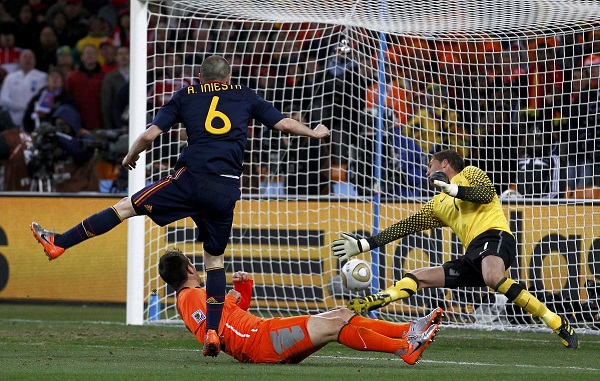On 6 September 2006, in front of 14,500 fans at Windsor Park, Spain's serial underachievers once again came up short, losing 3-2 to Northern Ireland in a Euro 2008 qualifier.
No-one back home was particularly surprised. This was a side who had flattered to deceive for years. Since winning their only title - the 1964 European Championship - they had just once progressed beyond the quarter-finals of a major tournament.
Luis Aragones, the La Liga veteran appointed national team manager in 2004, had begun his reign with a promising 25-game unbeaten run. But once again the optimism disappeared, this time following a last-16 defeat at the 2006 World Cup by an ageing France side many felt were entirely beatable.
Three months on, Aragones knew something had to be done. That night in Northern Ireland convinced him things had to change.
It was the start of something remarkable. Within six years, Spain would be heralded as the most successful international team of all time. This is how it happened.
There had always been rumours about friction and conflict between players from different clubs and regions in Spain. When they lost the European Championship final to France in 1984 following a terrible goalkeeping mistake from the normally reliable Luis Arconada, some even made the absurd suggestion that he had made the error on purpose because he was Basque and did not want Spain to win.
"There were a lot of players from Real Madrid and others from Barcelona - and when we got together, you noted a certain distance from players of different teams," says former Spain striker Fernando Morientes of the side he played in during the early Aragones era. "There wasn't the same togetherness in the day-to-day living that we see now."
Politics wasn't the main barrier to success this time, though. First of all, it was the tactics.
Against Northern Ireland in Spain's second competitive match after the 2006 World Cup, Aragones realised that the style favoured by his predecessors - a direct, or even long-ball approach - was not working.
But in order to achieve the change he wanted, harsh choices had to be made. Choices that brought Aragones perilously close to losing his job.
READ ALSO:Â Carlo Ancelotti leaves Everton to re-join Real Madrid as head coach
Real Madrid superstar Raul was much more than just another player. He was an icon. To many Spaniards, he was the essence of what they thought their country's football should be.
After the defeat in Belfast, Aragones saw that Raul no longer fitted into Spain's overall plan. He dropped the striker. Madrid's media went into meltdown. Axing a legend was bad enough, but this was compounded - in their opinion - by the disrespect of not having contacted the player personally to inform him.
Raul was 29. The Northern Ireland game was his 102nd for Spain. It would be his last. Aragones was unapologetic.
"I didn't call Raul to let him know he wasn't selected," he said. "He is not an exceptional case. The simple fact is that the players I've called up are most suited to our needs."
While the manager set about trying to reinvent Spain's style of play, Madrid's media sharpened their knives.
Defeat by Sweden and a draw in Iceland meant the team were in danger of missing out on Euro 2008 altogether when they travelled to Denmark on 13 October 2007. A loss in Aarhus would almost certainly have sealed Aragones' fate.
Instead, it went down as the night Spanish football was reborn.
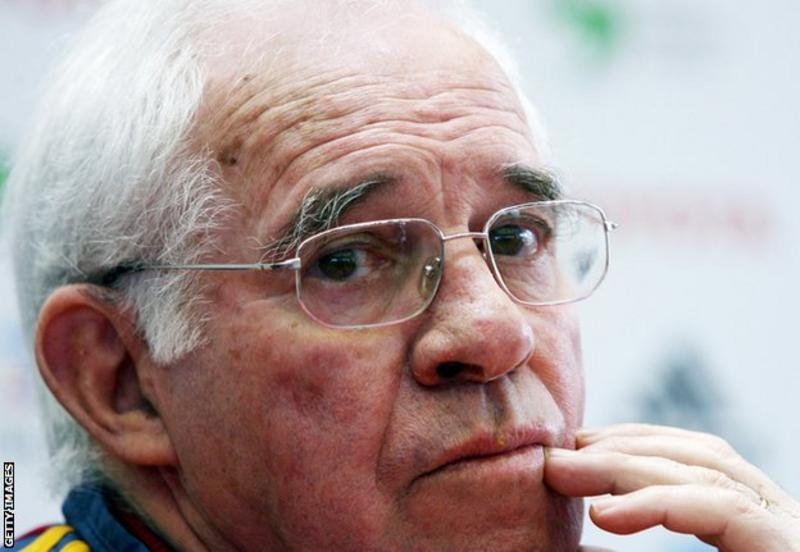
Former Barcelona striker David Villa, remembering the game, says: "We had everything to play for. If we'd lost, we would have been looking for a place in the play-offs at best. Maybe we wouldn't even have managed that."
Aragones' Eureka moment came in the 39th minute, when a 30-pass move culminated in then full-back Sergio Ramos chipping the ball over the Denmark goalkeeper for Spain's second goal. They went on to win 3-1 and qualified for the Euros as group winners.
More importantly it signalled the arrival of the new Spain, defined by passes and collective work.
Fernando Hierro, who was Spain's sporting director at the time, recalls: "There was a lot of tension before the game because of the importance of that fixture.
"Denmark were very strong, but we were calm and Luis was responsible for relaying that calm to everyone, saying: 'Don't worry, relax, tomorrow we'll win 3-1.'
"Incredibly, he even got the scoreline right."
Midfielder Marcos Senna sums up the change in style succinctly: "For the first time Aragones opted to go for the small ball players in the middle."
The manager had examined the gifts he had at his disposal. Plenty of very good midfielders. Passers of the ball. He decided to use them - but he added a bit of spice as well. On numerous occasions, he would say to Xavi, Andres Iniesta and Santi Cazorla: "How do you win games? Scoring, no? Why the hell don't you score more?"
The seed was planted for a style that was beautiful to watch, but also efficient.
'Breaking our curse' - Euro 2008
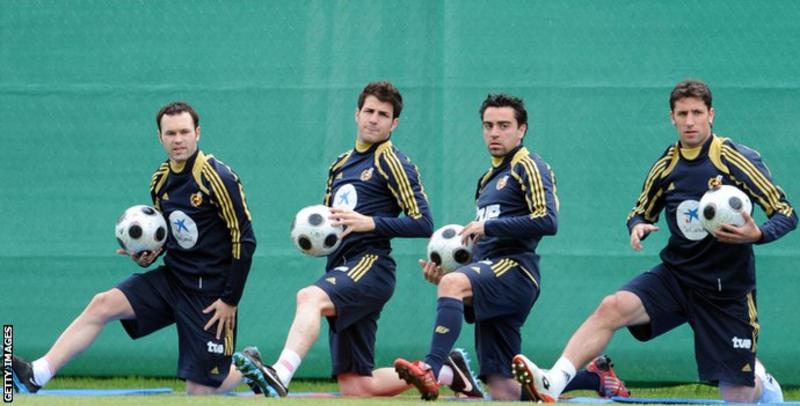
From left to right: Andres Iniesta, Cesc Fabregas, Xavi and Joan Capdevila in training during Euro 2008
Having finally secured their place at the Euro 2008 finals in Austria and Switzerland, Spain had a chance to end a 44-year trophy drought.
"I remember the day we arrived in Austria," says left-back Joan Capdevila.
"We got there at midday and the normal thing would have been to get straight into training. But Luis told us we had free time until the next day. Imagine! We were so surprised: we'd only just got there and he was giving us time off.
"I think we started to win at that moment because he knew details like these would bring us together."
After cruising through their group, Spain faced a quarter-final against bogey side Italy, who they had never beaten in a major competition.
"It added another dimension to it," says Capdevila. "They're a prestigious team and we had the hoodoo of always getting beaten by the bigger nations. We would play well but we would lose."
In the match, Spain dominated but could not score. It was 0-0 as the end of extra time approached. A penalty shootout loomed.
Aragones turned to his assistant Jose Ufarte and asked him to prepare for the shootout.
Jesus Paredes, Spain's fitness coach at the time, takes up the story: "He [Ufarte] started to prepare a list of penalty takers and when he had some doubts about one or two he consulted with Aragones.
"The manager said 'show me'. He looked at Ufarte's list, scrubbed it out and then put Cesc Fabregas as the last taker."
Capdevila remembers Fabregas' spot-kick perfectly.
"I was on the halfway line and I couldn't see the goal," he says. "Gianluigi Buffon was so big, he looked like a giant.
"I don't know how Cesc could take that penalty. If it had been me, it would have given me a big headache - and I was one of the senior players."
Score, and Spain were through.
READ ALSO:Â Barcelona sign Sergio Aguero on two-year deal
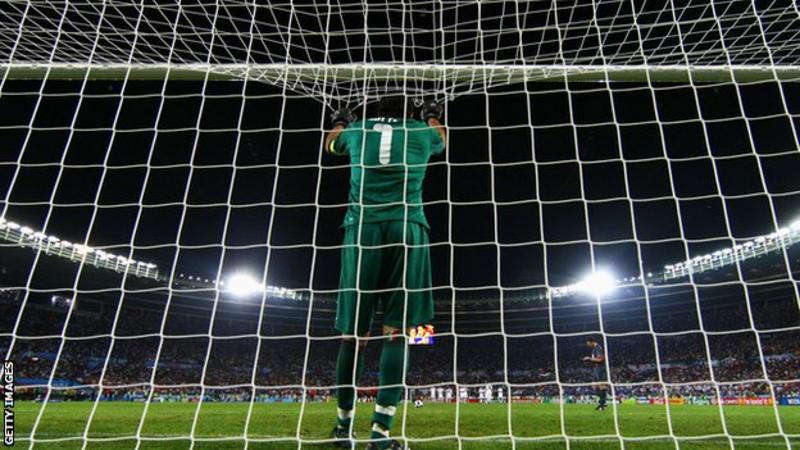
Fabregas stepped up, and calmly slotted the ball to Buffon's left. Spain had finally beaten Italy.
Back in the dressing room, he was approached by Paredes, who said: "Great penalty Cesc - you looked so confident.
"Jesus," Fabregas replied, "that was the first penalty I have taken since I was 14."
Alfredo Relano, former editor-in-chief of AS, one of Spain's most influential sports newspapers, says: "Everything changed for me at that moment.
"After that, I didn't have any doubts in the national team for the rest of the Euros or even beyond.
"It was like we had broken the curse and we were playing really well. It happened all over Spain. We shook off our pessimism."
Hierro adds: "That's when Spain became a dominant force. That was the moment we changed history."
For generations of Spaniards, including Jose Luis Zapatero, then the country's prime minister, it was a defining moment in their lives.
"From people of my age, Cesc will have tributes and recognition forever because I am of the generation that thought we would never see Spain go past the quarter-finals," he says.
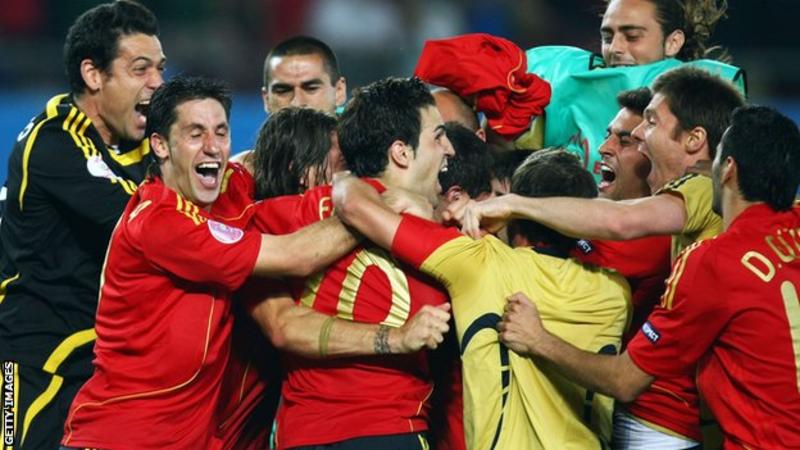
In the semi-finals, a liberated Spanish side played with freedom against Russia to put on their best performance of the tournament, winning 3-0 to cruise into their first final for 24 years.
"A weight had been lifted," Capdevila says. "In the semi-finals, you saw the best of our team. We had a terrifying confidence in ourselves in that match and we knew we were going to make the final, no matter what happened."
It would be Germany next.
The day before the match, Aragones gave a team talk that is still remembered by the players present.
"He got us together in the middle of the pitch at training," recalls Capdevila. "He said: 'Wallace isn't going to play.' We were all thinking, Wallace? Who's Wallace?
"I think it was Xavi who said: 'Boss, who's Wallace? Do you mean Ballack?'
"'Whatever, I call him Wallace,' Aragones replied. That broke the tension of the final because we all fell about laughing."
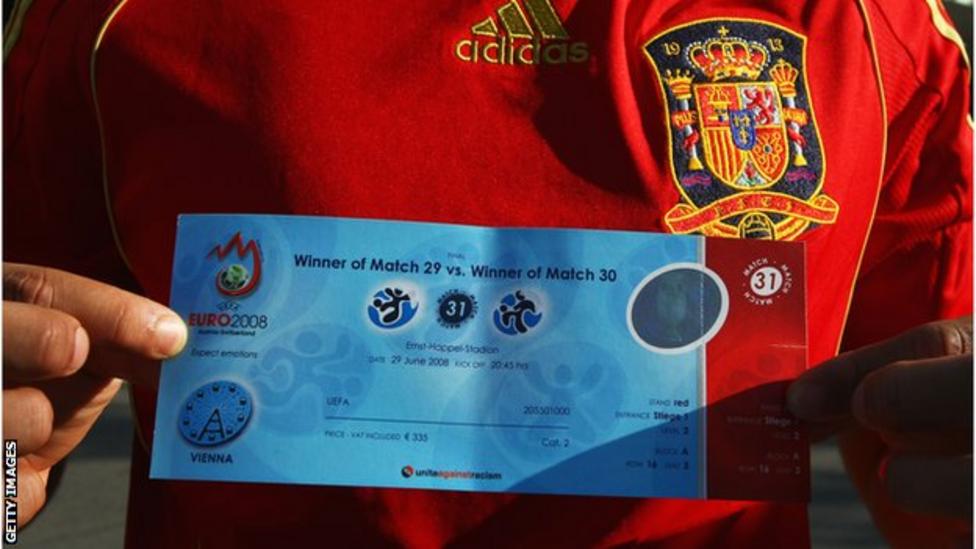
On 29 June 2008 in Vienna, Aragones' influence would once more prove crucial.
In the dressing room before the final, he told striker Fernando Torres: "Niño, get in between the two centre-backs so they are forced to drop off. Wait to one side of them and run in behind when we have the ball."
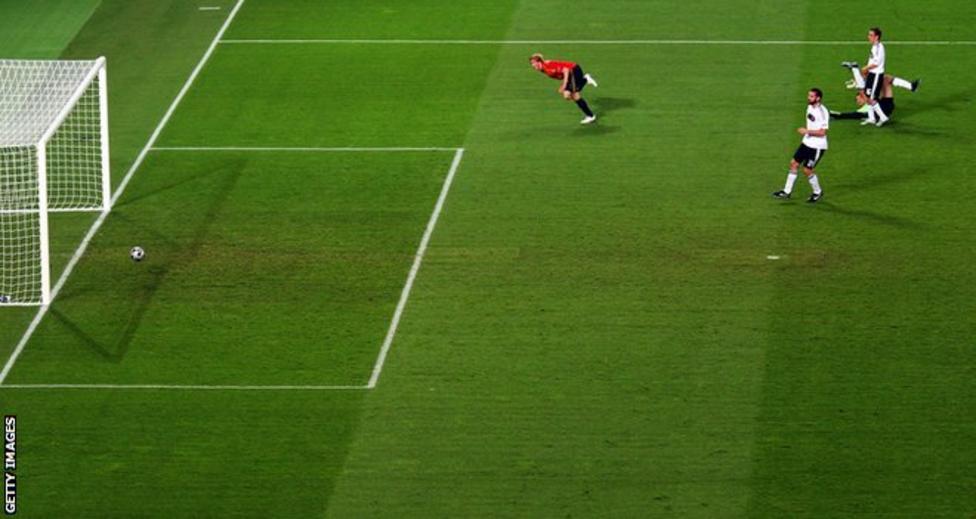
Looking back now, it is a perfect description of how Torres would breach the German defence, running on to a Xavi through ball to score the winning goal.
Villa says: "After all those dark days, when for one reason or another, your country is knocked out of the World Cup or a European Championship, that day the country let out a sigh of relief and said: At last."
For Spain, it was just the start. But they would continue without Aragones.
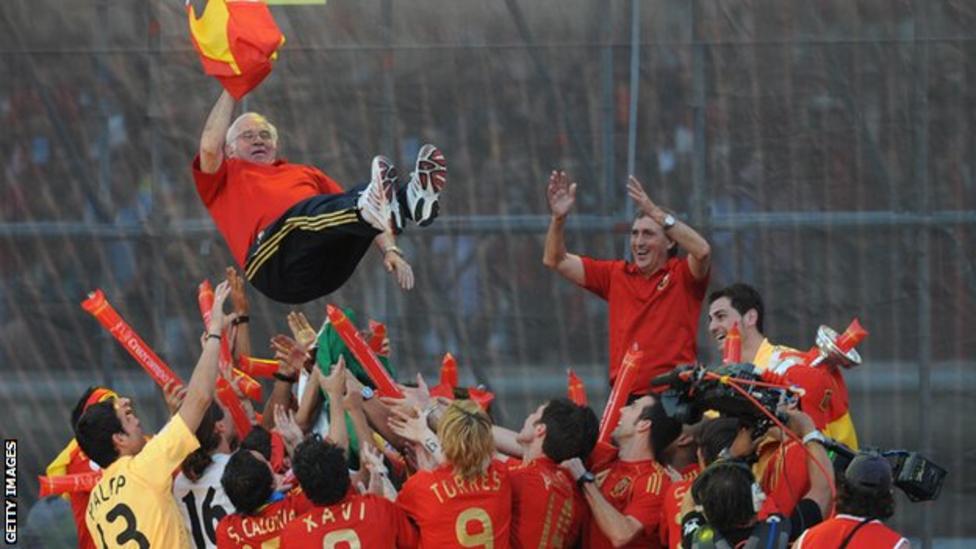
Aragones had announced in September 2007 that win or lose, he would be calling it a day after the summer of 2008.
The Spanish Football Federation had his replacement lined up. A deal was in place with former Real Madrid boss Vicente del Bosque.
But when the Spanish team's plane was caught in air traffic above Innsbruck for about an hour on the way home from their Euros triumph, the whole team broke into non-stop chants of "Luis - ¡Quedate!" ('Luis - Stay!')
Clearly moved by the show of affection, Aragones would have liked to change his mind at that point and the players were very much in favour of him remaining in the post. It was left to Spain's director of football at the time, Hierro, to make the decision. He stuck with the original plan to bring in Del Bosque.
"I have no doubt in my mind that the manner in which I made my decision was correct," Hierro says now. "My conscience is clear on that."
On 1 February 2014, Aragones - a controversial figure but the man who finally brought success to his football-crazy nation - died at the age of 75.
Capdevila says: "We are all very grateful for what he did, firstly to bring together a great team full of talent and a great atmosphere and secondly to provide all his football wisdom. He was a sage. We all have great memories of him because he left his mark on all of us."
Â
Conquering the world
From the start, Del Bosque said he had the perfect blueprint for success. Even so, he changed around a third of the squad for the 2010 World Cup and a further third before the 2012 European Championship.
The art was to introduce new faces while creating the feeling that nothing had changed at all.
Spain went to the World Cup in South Africa following an unbeaten qualifying campaign with their stock high. They promptly lost their opening group game 1-0 to Switzerland.
"It was a big setback and almost unthinkable as we weren't prepared for it," says Del Bosque. "We weren't looking to apportion blame. If anything we were all to blame collectively."
The emphasis was on not letting any self-doubts creep in, but tension before the next match against Honduras was palpable. Villa would later say it was "the hardest moment of the whole World Cup".
Qualification was still possible with two victories in the next two games. Defeat would almost certainly have seen Spain eliminated.
Honduras were beaten 2-0, but a draw against Chile in the final group match could still have seen them eliminated.
The silence before the match, both on the coach and in the dressing room, was deafening.
Del Bosque explains the atmosphere: "I had a manager many years ago who would demand absolute silence in the dressing room an hour before a game, with nobody else in the room to guarantee maximum concentration. But this is a group that plays loud energetic music to help get them into the mood.
"On the days of the games against Honduras and Chile, you could hear a fly pass by."
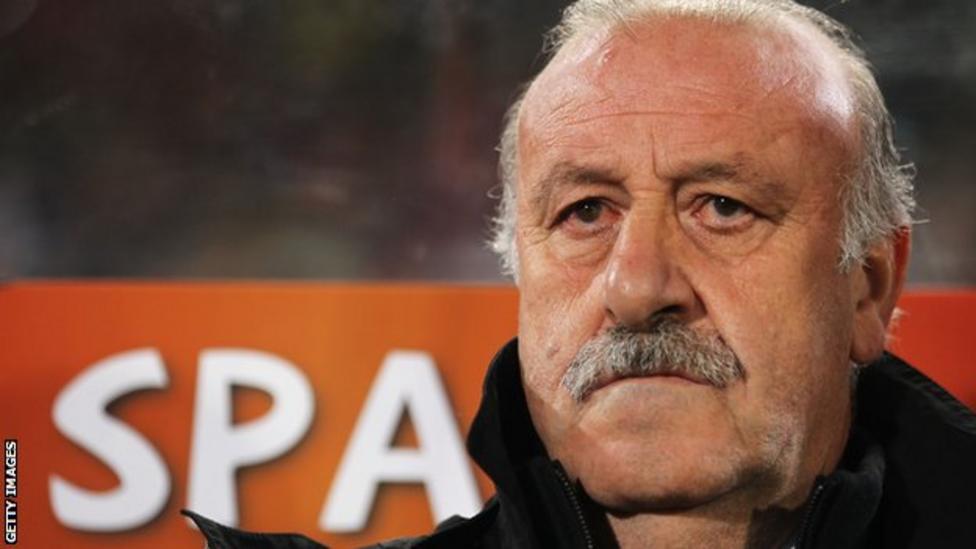
After Spain beat Chile 2-1, Del Bosque told his players they had four finals ahead of them - the last 16, the quarters, semis and then the actual final.
Portugal were beaten first, then came Paraguay in another of those crucial quarter-finals. Spain had never progressed beyond that stage in a World Cup. And once again the wheels very nearly fell off.
"Everyone thought Paraguay were a team we would defeat easily but nothing could have been further from the truth," says Capdevila.
The Paraguayans played as if their lives depended on it. Villa commented afterwards that "it seemed like there were 20 of them on the pitch". For Spain, it was a nerve-racking match; Iker Casillas saved a penalty and then Xabi Alonso missed a twice-taken spot kick.
"It was an insane game, a game when you knew that whoever scored first was going to win," Villa says.
Del Bosque remembers it well: "At times my legs were literally shaking, which is something that you just can't control."
Villa got the decisive strike, a bizarre goal that eventually went in after hitting both posts, almost as if the ball was trying its best to stay out. Villa said later it was "effectively a golden goal, without doubt my most important one".
Germany came next and, just as in 2008, Spain reserved their best performance of the tournament for the semi-finals, advancing thanks to a winning goal made in Barcelona.
With the teams level at half-time, central defender Carles Puyol mentioned to Xavi on the way to the changing rooms that, if they were to get a corner in the second half, he should float it in around the penalty spot as he knew he could soar and score exactly as he had done previously for his club in a match against Real Madrid.
Puyol headed in the winner in the second half to seal Spain's third consecutive 1-0 victory in the knockout stages. It set up a meeting with the Netherlands in the final in Johannesburg.
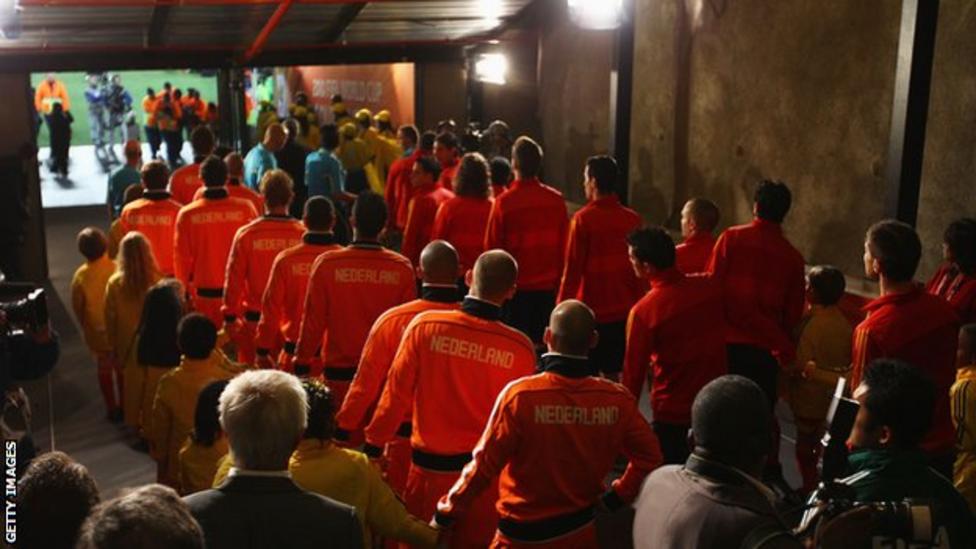
Former prime minister Zapatero recalls his feelings before the match. "I was with my wife and daughter and we were a bundle of nerves," he says. "We have never seen each other so tense. I have never seen my wife so immersed in a game a football so much in my life."
Del Bosque says: "We were defending our country. But we were also defending our style of football."
Capdevila cannot remember taking part in a more physical game. "Maybe they thought we were better than them with the ball, and aggression was the only way they could stop us," he reflects. "But I think it was excessive. I was very surprised."
With everyone convinced the match would go to penalties - Arjen Robben had wasted a glorious chance for the Dutch in the second half - Iniesta's 116th-minute goal rewrote Spanish football history.
"The ball came to my feet and I had two options," says Fabregas. "Shoot or pass. I've always wondered what would have happened if I had shot. But I saw Iniesta in a great position and it was the best moment of our careers."
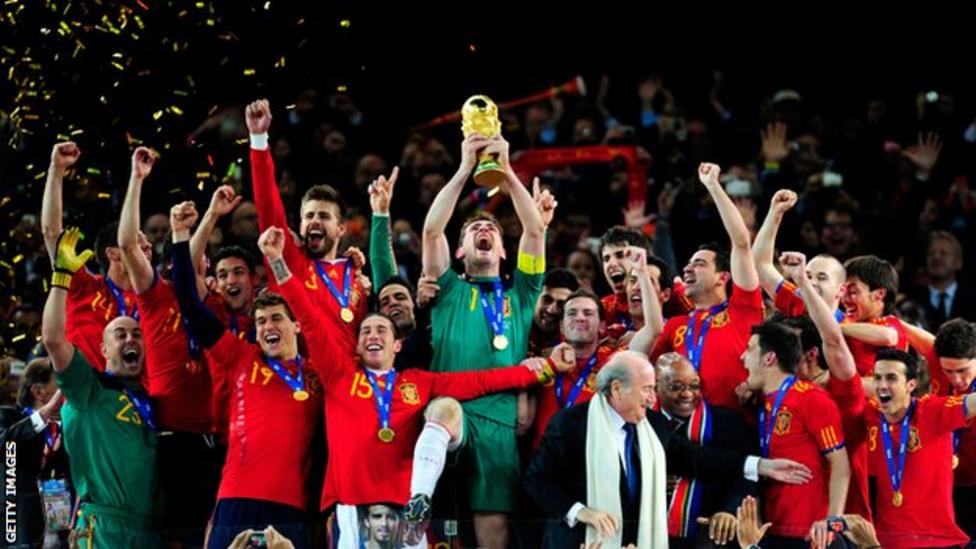
"That 70 metres to the corner flag was the fastest I have ever run," says Capdevila. "I would even have overtaken Gareth Bale! But it was the most powerful, most beautiful moment of my life. It was unique and is still very emotional to recall."
Villa says: "We thought that this tournament belonged to a Brazilian, an Italian or a German and we never imagined someone wearing the red shirt picking up that trophy. It seemed like something so difficult, virtually impossible."
Capdevila adds: "One of the most emotional experiences I have had on a football pitch was after lifting the cup and doing a lap of honour. I was able to see my poor long-suffering parents crying in the stadium. My mother had paid 1,200 euros to come to see this game.
"You remember a lot of things, like when you were little and they used to take you to and from training every day. You realise the sacrifice they made and to see it rewarded in a stadium full with 80,000 people was almost unthinkable. Watching my parents cry was very emotional."
Three in a row - history is made
Spain went to Euro 2012 in Poland and Ukraine as favourites, but not everyone was a fan.
"Why don't they shoot more often?" German World Cup-winning captain and manager Franz Beckenbauer remarked when asked about Spain.
Despite such criticism, they were more effective than ever. In the words of Zapatero: "The final of Euro 2012 was arguably the greatest moment of the team built by Aragones and Del Bosque. The team was like a clockwork mechanism."
No-one had ever won a final as convincingly as Spain did, outclassing Italy to win 4-0 and become the first international team to win three consecutive major tournaments.
Del Bosque describes his side's performance in the final as "the best game we ever played".
Hierro adds: "They saw themselves as winners in the Spain shirt and when they came together as full internationals, they were already used to winning.
"It was a beautiful and very difficult thing that they achieved, to have such a great understanding together and that was thanks to Aragones' gamble on so-called small players in Euro 2008.
"They were all very comfortable with each other and that becomes easier when you are winning, but the fact they were so comfortable with the philosophy and style of football made them very powerful indeed."
Capdevila sums up the feeling of the generation when he says: "What I have had the fortune to experience are stories I will tell my children and my grandchildren in years to come.
"I am desperate to tell them already. I have been so lucky. I had the privilege of sharing a dressing room with some of the best players in the world."
But having made history, the dream of a fourth title in a row would soon die. The 2014 World Cup in Brazil signalled the end of the road for this all-conquering Spanish side.
Was it complacency from the players? Misplaced loyalty shown to the old guard? Or simply the end of an era for a team that had dominated world football over the previous six years?
It was probably a bit of everything.
Del Bosque wanted to gift that generation a send-off on the biggest stage.
But the beginning of the end came in the same way as had the road to all-conquering glory; with a goal of stunning brilliance.
This time it was a diving header from Robin van Persie, an incredible finish that drew the Netherlands level after Xabi Alonso had put Spain ahead in their opening game. Spain would go on to be humiliated 5-1.
The simple truth was that for the side that will be forever remembered as the very best of its generation - one that reinvented the approach to the way football should be played - the party was over. But what a party it had been.
By Guillem Balague, Spanish football writer

